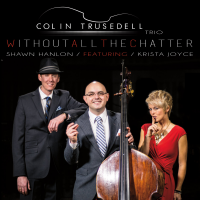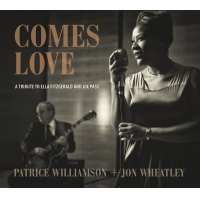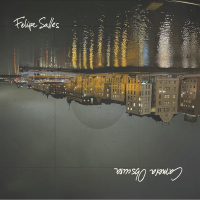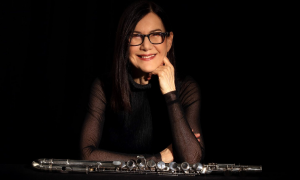Home » Jazz Articles » Interview » Lew Tabackin: A Life in Jazz
Lew Tabackin: A Life in Jazz

Zoot Sims took me to meet Coleman Hawkins and I saw a man who was only 60 years old who wanted to die. He had been the king and then other people rose to prominence, like Sonny Rollins and Stan Getz and suddenly Coleman's career diminished. Those old veterans didn't practice or stay in shape. They would play a gig and it would be a disaster. It happened to so many older guys. It taught me to maintain my skills so when the opportunity does come you are up to the demand.
—Lew Tabackin
Lew Tabackin
saxophone, tenorb.1940
Recently, I had the opportunity to spend several hours with Mr. Tabackin for this interview. Rather than insert myself into the conversation, I just let the tape roll, threw in a few topics and let the master jazz man expound on them in one free wheeling solo after another. What follows are his unedited commentary.
Challenges Of Mature Musicians
Jazz musicians are neglected in middle age. Period. Thirty or Forty years ago, promoters were into presenting young lions and established veterans. That left a void for the people of my generation. We didn't fit into either category. Now that I am older those opportunities have dried up, so I missed the boat. Promoters are no longer enamored with promoting old guys who aren't going to be around much longer.
When I was a middle aged guy, most of the great musicians like

Clark Terry
trumpet1920 - 2015

Art Blakey
drums1919 - 1990

Johnny Griffin
saxophone, tenor1928 - 2008

Dexter Gordon
saxophone, tenor1923 - 1990
In order to get some exposure I recorded Soundscapes with my working trio. I hired a company to send product out to radio stations and we got amazing reviews and I was encouraged by it. The album even began to move higher on the jazz charts for a minute. But overall, I haven't seen a great improvement or much return from my investment. We make recordings so that people know that we still play and possibly get some gigs.
Like most people my age, I don't have a management team or much in terms of support. I have an artist page on Facebook that I never do anything with. Younger musicians have the energy and competence to use social medium and have learned how to use it to survive. Most of the people my age don't have that competence and I'd rather spend time working on playing a low b flat than putting in ten hours promoting myself.
PR can sell pet rocks and mediocre musicians. But music requires playing with a certain amount of passion and respect and trying to bring people in—not in a superficial way but in a real way. For example, last night at the gig I was approached by a couple of young women who weren't jazz people. They said they were emotionally touched. I think that is really important.
My philosophy is that I am never going to achieve my goal, but it is the effort of getting as close as you can that is important. Sometimes you go through a period where you aren't doing too well, but you keep fighting and you eventually get ahead. Life is like that for a musician. You keep trying to find a way to improve your expression. Not how many notes you can play, but making the music more communicative.
Racial Issues
I was around during the black revolution and while it was a great event, the byproduct had a negative effect on people like me. At some point as a young player in Philadelphia, playing in mainly black clubs with black musicians some people began to ask about the white guy playing, although most of the musicians were cool. For example, I was playing in

Duke Pearson
piano1932 - 1980

Randy Brecker
trumpetb.1945
Heading West And The Big Band

Arnie Lawrence
saxophoneb.1938

Doc Severinsen
trumpetb.1927
While living in L.A., I was invited in a bunch of rehearsal bands and most of the music was practicing for commercial work. I didn't like it and I was bored. So I encouraged Toshiko (Akiyoshi) to get some charts together and that's how the big band started—out of boredom.
One of my more positive experiences on the West Coast was my association with

Shelly Manne
drums1920 - 1984

Mike Wofford
pianob.1938
Chuck Domanico
b.1944I didn't feel natural out there and I had to create my own environment. In New York I was playing in

Clark Terry
trumpet1920 - 2015

Duke Pearson
piano1932 - 1980
Low Periods

Zoot Sims
saxophone, tenor1925 - 1985

Coleman Hawkins
saxophone, tenor1904 - 1969

Sonny Rollins
saxophoneb.1930

Stan Getz
saxophone, tenor1927 - 1991
Influential Musicians-Recordings
Some of the most influential musicians for me are

Billy Higgins
drums1936 - 2001

Toshiko Akiyoshi
pianob.1929

John Lewis
piano1920 - 2001

Elvin Jones
drums1927 - 2004

Jimmy Knepper
trombone1927 - 2003
Some of the recordings that impacted me were those by

Al Cohn
saxophone, tenor1925 - 1988
Jewish Culture
There is a lot of genetic stuff you don't know about. Jewish people have a sense of pathos and a kind of cry that you can hear in someone like Al Cohn. Sometimes I would play something—more on the flute than the saxophone—and I would get into an Eastern kind of thing without thinking about it. While I do not particularly like the idea of the chosen people, I do have a feeling for my cultural heritage. I feel my Jewishness. It's innate, not intellectual. When you grow up as a Jew you know you are Jewish. I don't think about it, but I know it's there and it's something to be proud of. I definitely feel the connection.
Other Musicians

Miles Davis
trumpet1926 - 1991
Coleman Hawkins—He was our father. It took me a long time to understand his greatness. He was a true avant-garde musician. He was always ahead of his time. Can you imagine what it was like to be that much of a pioneer? To come up with really meaningful solos with the ultimate harmonic sophistication? He was as sophisticated as Bird harmonically. He played unaccompanied solos -stream of consciousness -before Sonny Rollins. When he hired

Thelonious Monk
piano1917 - 1982

Bill Evans
piano1929 - 1980

Chick Corea
piano1941 - 2021

Urbie Green
trombone1926 - 2018

Charlie Haden
bass, acoustic1937 - 2014

Ornette Coleman
saxophone, alto1930 - 2015

Kenny G
saxophone, sopranob.1956
I'm not a fan, let's put it that way. He found his thing and it works for him and its not my fault.
Contribution To Jazz
When I first started to play, I had the dream of being the next Bird. I soon realized it was probably not going to happen and I started to doubt the idea of becoming a jazz musician. I thought that maybe I would just become a studio player. But if everyone felt like that there wouldn't be any players.
I decided that you just have to find out who you are and that's a contribution. If you pursue your individuality then that is a contribution. I think I reinforced the idea of individuality. As a flutist I think I did something that was different. I didn't create a Lew Tabackin school of playing, but my contribution is that I pointed a way for people to respect a personal approach to jazz.
Highlights Of Career
I was playing in Canada at a festival. I was in a club. This pianist

Muhal Richard Abrams
piano1930 - 2017

Dave Holland
bassb.1946
Playing the Hiroshima Rising from the Abyss in Hiroshima on the anniversary of the bombing was a very moving experience.
A highlight for me that nobody knows about. I played Bloodcount with

Kenny Barron
pianob.1943
Photo credit: Dick Stockmans
Tags
lew tabackin
Interview
Rob Rosenblum
United States
Clark Terry
Art Blakey
Johnny Griffin
Dexter Gordon
Philadelphia
Duke Pearson
randy brecker
Arnie Lawrence
Doc Severinsen
Shelly Manne
Mike Wofford
Chuck Domanico
Zoot Sims
Coleman Hawkins
Sonny Rollins
Stan Getz
Billy Higgins
Toshiko Akiyoshi
John Lewis
Elvin Jones
Jimmy Knepper
Al Cohn
Miles Davis
Thelonious Monk
Bill Evans
Chick Corea
Urbie Green
Charlie Haden
Ornette Coleman
Kenny G
Muhal Richard Abrams
Dave Holland
Kenny Barron
Comments
PREVIOUS / NEXT
Support All About Jazz
 All About Jazz has been a pillar of jazz since 1995, championing it as an art form and, more importantly, supporting the musicians who make it. Our enduring commitment has made "AAJ" one of the most culturally important websites of its kind, read by hundreds of thousands of fans, musicians and industry figures every month.
All About Jazz has been a pillar of jazz since 1995, championing it as an art form and, more importantly, supporting the musicians who make it. Our enduring commitment has made "AAJ" one of the most culturally important websites of its kind, read by hundreds of thousands of fans, musicians and industry figures every month.








 Buy Now
Buy Now





















